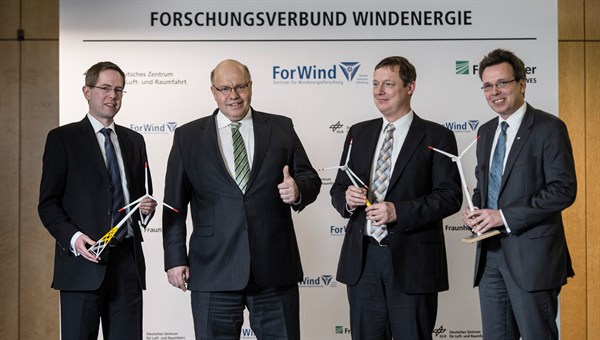A unique alliance for German wind energy research was officially formed in Berlin today – the Wind Energy Research Alliance. Representatives of the three partners, the German Aerospace Center (Deutsches Zentrum für Luft- und Raumfahrt; DLR), ForWind, the Center for Wind Energy Research of the universities of Oldenburg, Hanover and Bremen, and the Fraunhofer Institute for Wind Energy and Energy Systems Technology (IWES) signed the cooperation agreement. The combined expertise of more than 600 scientists will pave the way for groundbreaking impulses for a renewable energy future based on on- and offshore wind energy.
The research association, through the strength of its personnel and by networking knowledge and expertise, will be able to successfully process long-term and strategically important major projects. A research infrastructure with test centres and laboratories will process innovative issues and set standards across the globe.

Federal Minister for the Environment Peter Altmaier welcomed the founding of the research alliance: “A coordinated alliance for wind energy research strengthens companies based in Germany and contributes to their future sustainability. A successful energy turnaround requires efficient and reliable wind energy turbines, which the research alliance is working on”.
The community of the research alliance has an international charisma and opens up synergies for upcoming major projects in the wind industry. Answers to technologically demanding questions are urgently needed for the increasing professionalisation of the branch and maintaining its technological leadership. The partners’ content-related cooperation starts directly in the BMU funded project “Smart Blades – Development and Construction of Intelligent Rotor Blades” which has a project volume of 12 million Euros and a runtime of 39 months.
Joint research on intelligent rotor blades
Researchers expect that smart blade technologies will result in rotor blade load reduction enabling an aerodynamically optimised and lighter design of wind energy turbines. Design changes can lead to reductions in material and logistics costs and increases in turbine service life.
Rotor blade trailing edges that can change their shape and flaps that divert wind when required – very large rotor blades equipped with such mechanisms can systematically correct gusts and reduce performance fluctuations. As a result, susceptibility to damage can be reduced and longer service life achieved. Such active technologies are already being tested in aeronautics and will now be applied to wind energy.
If the wind blows too strongly, today’s rotor blades are turned full length out of the wind. In the meantime, the new blades, up to 85 metres in length, move over an area equivalent to more than several football fields with every rotation. The gustiness of wind though, leads to very different wind conditions within this large area and so cannot be taken into account when making blanket – and also relatively slow – adjustments to the entire rotor blade. For this reason local flow is now to be influenced more accurately and quickly through movable slats, trailing edges and other systems.
Great challenges in the wind energy branch
Turbine builders so far have shied away from the development and use of smart blades. The great challenge will be that through use of active mechanisms the rotor blades do not become less reliable, heavier and more maintenance intensive and prime costs do not increase. Therefore, the target of the research project is proving the feasibility, efficiency and reliability of smart blades.
The kick-off for this first major alliance project is today, meaning that work, using one ‘passive’ and two alternative ‘active’ technologies, on the rotor blade design tasks can begin immediately.



